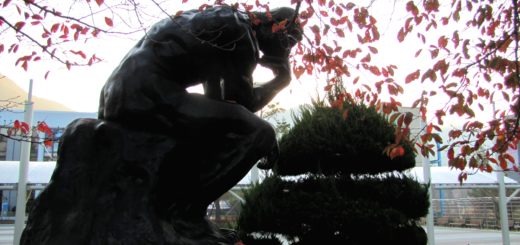Thinking of Yourself
Applause.— In applause there is always a kind of noise–even when we applaud ourselves.
— Nietzsche, The Gay Science (Kaufmann translation), §201.
Had Nietzsche been a little older when he wrote those words, he might have said “especially when we applaud ourselves.”
Applause is always partly noise, in the sense of distraction, disturbance of the peace. And the special distraction of this noise stems not from its inherent tumult and cacophony, but rather from its attractiveness. For the kind of noise that is intrinsic to applause carries the special allure of the approving, cajoling, perhaps even craving crowd, which is to say the allure of submitting to the (superficially) pleasing momentum of the collective, rather than exerting the (superficially) painful resistance of the individual; of giving in rather than standing up; of feelings rather than reason; of reacting rather than initiating; of being moved rather than moving. In short, the noise of applause dangerously distracts us with the appeal of the body. The smile induced by hearing ourselves applauded is the smile of a soul being tempted away from itself, and into the great undulating sea of undifferentiated matter.
Perhaps Nietzsche, who himself had a weakness for the noise of self-applause — which is why he recognized its poisonous character — can clarify the matter a little further, if we supplement the aphorism quoted above with the following related notion, from the same context:
Against those who praise.— A: “One is praised only by one’s peers.” B: “Yes, and whoever praises you says: I am your peer.”
— The Gay Science, §190
As applause is nothing but a form of praise, we may put these two ideas side by side to reveal something important.
A: “One is praised only by one’s peers.” B: “Yes, and whoever praises you says: I am your peer.”
C: “And therefore to applaud oneself is to declare oneself equal to one’s most praiseworthy thought or deed.”
That is, if the applause of the crowd says, presumptuously, “We approve of you, and we have the authority to bestow approval upon you,” then the applause one gives oneself says, “I am as good as my most beneficial act, as wise as my best idea, as interesting as my most impressive words.” But does this self-praise not make me my own “noisiest,” most distracting, most presumptuous audience? And the special cunning of this noise with which I distract myself is that it comes in the guise of a whisper, which makes it the most tempting praise of all: I myself become the undulating sea of undifferentiated matter — waves of comforting self-satisfaction washing over, and soaking, that tinderbox of the soul in which alone sparks might have been ignited.



